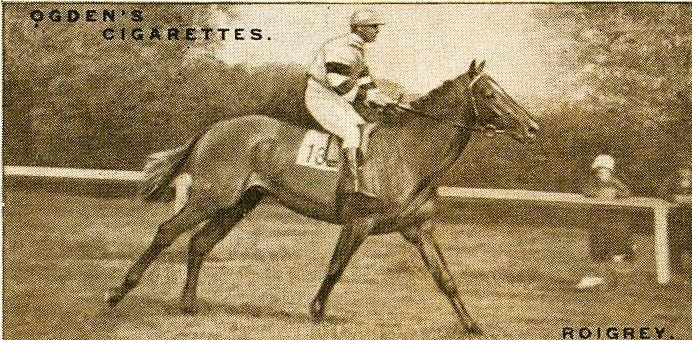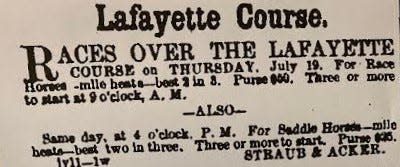The Way We Were: Augusta once had a racetrack a few blocks from courthouse

Kentucky's not the only place that features horse racing.
For much of the 1800s, Augustans enjoyed watching and wagering on the running of the region's fastest steeds at a site south of downtown.
"Augusta has always been noted for its love of fine horses and fine mettled racing," wrote the authors of the "Memorial History of Augusta" in 1890, and they were right.
A notice in the Dec 8, 1798 issue of The Augusta Chronicle, announced Richmond Jockey Club Races would "commence for the first time" beginning Dec. 13 at Gen. John Twiggs' place.
More The Way We Were: Meet the woman who stocked and secured Augusta's Cold War shelters
'I'm going to do it for Arbrie': Owner of horse killed in drive-by shooting to ride for Augusta girl
The Jockey Club actively promoted racing and made sure to publicize their events in the newspaper.
A January 1803 notice announced the beginning of the upcoming equine season with the races and their winning purses: 4-mile heat – $350 (about $9,000 today); 3-mile heat – $200; 2-mile heat – $150; and 1-mile heat – sweepstake for the entrance money.
The "Memorial History" also placed the first city race track in 1810 at what is now Greene Street. Horse racing then moved to Greene and Eighth, near the old Baptist Church. Then came the longest lasting venue – the Lafayette Race Course.
That track was located at the southwest corner of 12th (then Marbury Street) and Wrightsboro Road (then Turknett Springs Road).
In the decades to come many well-known horses ran in Augusta. A January 1854 account describes the "highly exciting" (and curiously named) horse Grif Edmondson taking on a field that included a filly sired by thoroughbred legend Glencoe. The filly got close, but "Grif" pulled ahead at the end.
Woven into the story of that race were the reaction of the bettors, and such wagering was popular. The center of such gambling was said to often be in an Ellis Street hotel called "Old Shades," which offered well-worn access to the track.

Racing and gambling, however, did not always sit well with authority.
In November 1890, The Atlanta Constitution reported Augusta postmaster J.T. Denning had refused to allow the U.S. mails to distribute The Chronicle because it had it reported betting pools, many run out of Augusta's Arcade saloon. This information, Denning said, violated state lottery bans.
The Chronicle protested, and U.S. Postmaster General John Wanamaker agreed with the newspaper.
"The publication of the result of horse races or pool selling, in connection with horse races, does not render the paper containing it unmailable," Wanamaker. said.
Although it featured traditional racing horses, some of its most publicized competitions involved harness racing, according to accounts in The Chronicle. The 1870s saw promotion of many such contests with "saddle horse" races mentioned as a secondary contest.
More Augusta history: The Way We Were: Mary Carter Winter had national impact, local influence
And: The Way We Were: He wasn't getting ahead in a cotton field so he reached for stars instead
The Lafayette Race Course also attracted other activities. Augusta's numerous gun and military clubs held marksmanship competitions and barbecues on its open space.
Like many leisure pastimes, interest in Augusta horse and harness races fluctuated, as demonstrated by the ebb and flow of newspaper notices.
Perhaps the last great push came in the closing months of 1882 when the newspaper noted the Lafayette's repairs, upgrades and improvements undertaken by two investors who had "redeemed that old piece of land from a trackless waste to a well ordered driving park."
It didn't last. Developer and street car businessman. D.B. Dyer would buy the old horse race track along with several other properties that would eventually become neighborhoods.
Today homes and residential streets in the Laney Walker neighborhood fill the property where horses once raced for the finish line.
Bill Kirby has reported, photographed and commented on life in Augusta and Georgia for 45 years.
This article originally appeared on Augusta Chronicle: Augusta history: Horses once raced (and bettors sure bet) where houses now stand

